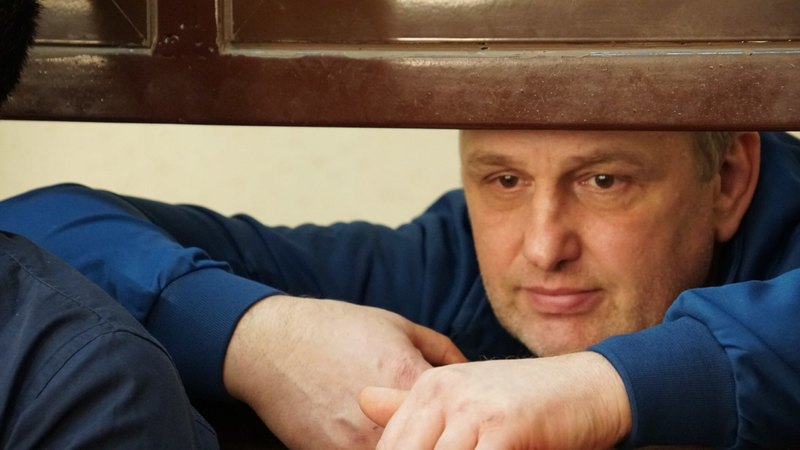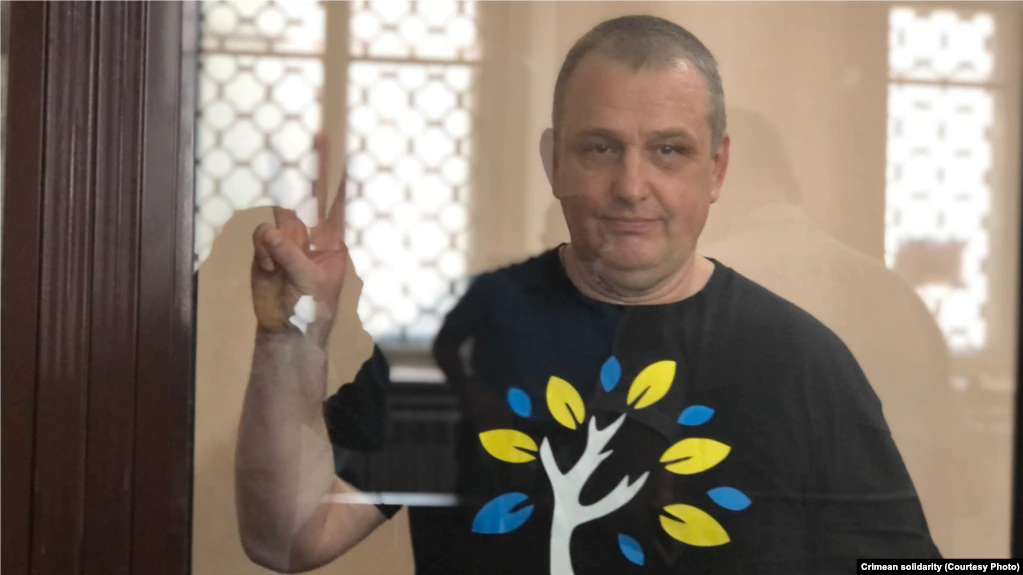Jamie Fly, RFE/RL’s President, urged Russia to immediately free Yesypenko.
Evidence in his case is manifestly incompetent. According to Yesypenko, the FSB planted a grenade in his car and tortured him into self-incriminating testimony.
This is the first time that a professional journalist has been subjected to torture in occupied Crimea to extract testimony.
This illegal imprisonment is not an isolated case. It is a part of Russia’s attack on Ukrainians and Crimean Tatars who have peacefully resisted the occupation regime in Crimea since 2014.
At least 127 Ukrainian prisoners are held in Russia and occupied peninsula for political reasons, a coalition of Ukrainian human rights NGOs reported.
On 9 March, Vladyslav Yesypenko, a RFE/RL journalist who reported on developments in Crimea, filmed a flower-laying ceremony at the memorial of prominent Ukrainian writer Taras Shevchenko in Simferopol, the regional capital of Crimea — an action reminiscent of days before the Russian occupation.
And just the next day, Yesypenko was detained by the FSB on “espionage” charges. Allegedly, the journalist made photo and video recordings of location, vital infrastructure, and public places in Crimea for Ukraine’s special services. And for his own security, Russian authorities claim, he kept аn improvised explosive device in his car.
The FSB managed to get “evidence” of alleged “keeping of explosives” — by planting grenades in Yesypenko’s car. Here is how he described this episode in a letter from behind the bars:
“Near Perevalne village I was stopped by a State Traffic Safety Inspectorate officer.
Then FSB officers arrived and laid me to the ground. Then got me up and started a search in my car. I was outraged. I said FBS worked clumsily and they would hit a rough patch…But when I spotted a grenade just planted inside my car I realized that it would actually be me who would hit the rough patch. And it may apparently drag on.”
Notably, the expertise failed to detect his fingerprints on the grenade.
Another piece of evidence in his case, the journalist’s public confession of alleged espionage for Ukraine’s security services, was extracted by means of torture. Vladyslav recalls the day of his detention on the road:
“I was forced to sign search reports. I refused and the FSB officer in a balaclava (apparently a senior) said that now we would go to another place, where I would sign everything he said; ‘we made worse guys spill their guts.’”
For 27 days after the arrest, independent lawyers were prohibited
from seeing Vladyslav Yesypenko. Meanwhile, journalists of Russian state media Krym 24 were given a green light to interview him. Soon, they published a video of the Ukrainian journalist testifying against himself.
In one of his letters, Yesypenko told about his torture:
“… They shoved me to the ground, put wires with loops around my ears and put an electric current through my body. The pain was unbearable. They turned a blind eye to my screaming. The guys did their job cooperatively and were bereft of emotions.
Between the torturing, they asked me questions, such as ‘what was the goal of our journey to Crimea,’ ‘we know you are a journalist but tell us about the orders from Ukraine’s special services,’ ‘when were you recruited,’ ‘what and where did you film in Crimea,’ ‘what do you know about Colonel Kravchuk.’
…If they did not like the answer to any of their questions, they put on the wires again and turned on the electricity. At some point, I realized that I can bear the pain and as my cries became weaker, the FSB officers, apparently professionals, assessed the situation and increased the current so that the pain would become unbearable again…”

In Crimea, a press card does not protect from torture. Putin views independent journalism as a threat to his regime of tyranny and violence in the peninsula. Hence,
“the course [is] taken by the new authorities from the moment of the occupation in 2014 to totally suppress independent journalism and establish full control over Crimea’s information space continues,” (Justice for Journalists Foundation’s report Attacks on media workers in 2020).
Ukraine’s Foreign Ministry, the Ombudsman, the European and International Federations of Journalists called for the urgent release of Vladyslav Yesypenko.
1. Join the online flashmob by posting a photo of Vladyslav Yesypeko and hashtags #FreeYesypenko and #CrimeaisUkraine on your social media.
2. Write a letter of support to Vladyslav Yesypenko and send it to [email protected] or Kateryna Yesypenko’s Facebook.
Related:
- Crimean Tatar leader Dzhelyal kept in unheated Russian prison as temperatures approach freezing
- Why this Crimean Tatar Muslim woman gives the Russian occupation authorities a headache
- Pull off a kangaroo court in five easy steps: a how-to guide from Russia
- “After they electrocuted me, I told them everything they needed.” How Russia’s FSB extracted a “confession” from a Crimean Tatar
- Painkillers instead of hospital: Russia’s torture of critically-ill Crimean Tatar political prisoners continues unabated
- How Crimean Tatar leader Dzhelyal swelled the ranks of Ukrainian “saboteurs”
- Stalin executed their great-grandfather 83 years ago. Now Russia sentenced these Crimean Tatars on same charges
- Seven years of occupation of Crimea: human rights activists systematise human rights violations on peninsula
- “I do not want my children to live in a country of terror.” Four inspiring letters from Crimean Tatar political prisoners not broken by Russia
- Russia’s vile attempts to discredit the Crimean Tatars must not be kept silent
- Photo project spotlights Crimean Tatar kids born after their fathers’ unlawful arrests by Russian occupation authorities
- Russian prison system is a ticking time bomb for health of a Crimean Tatar

